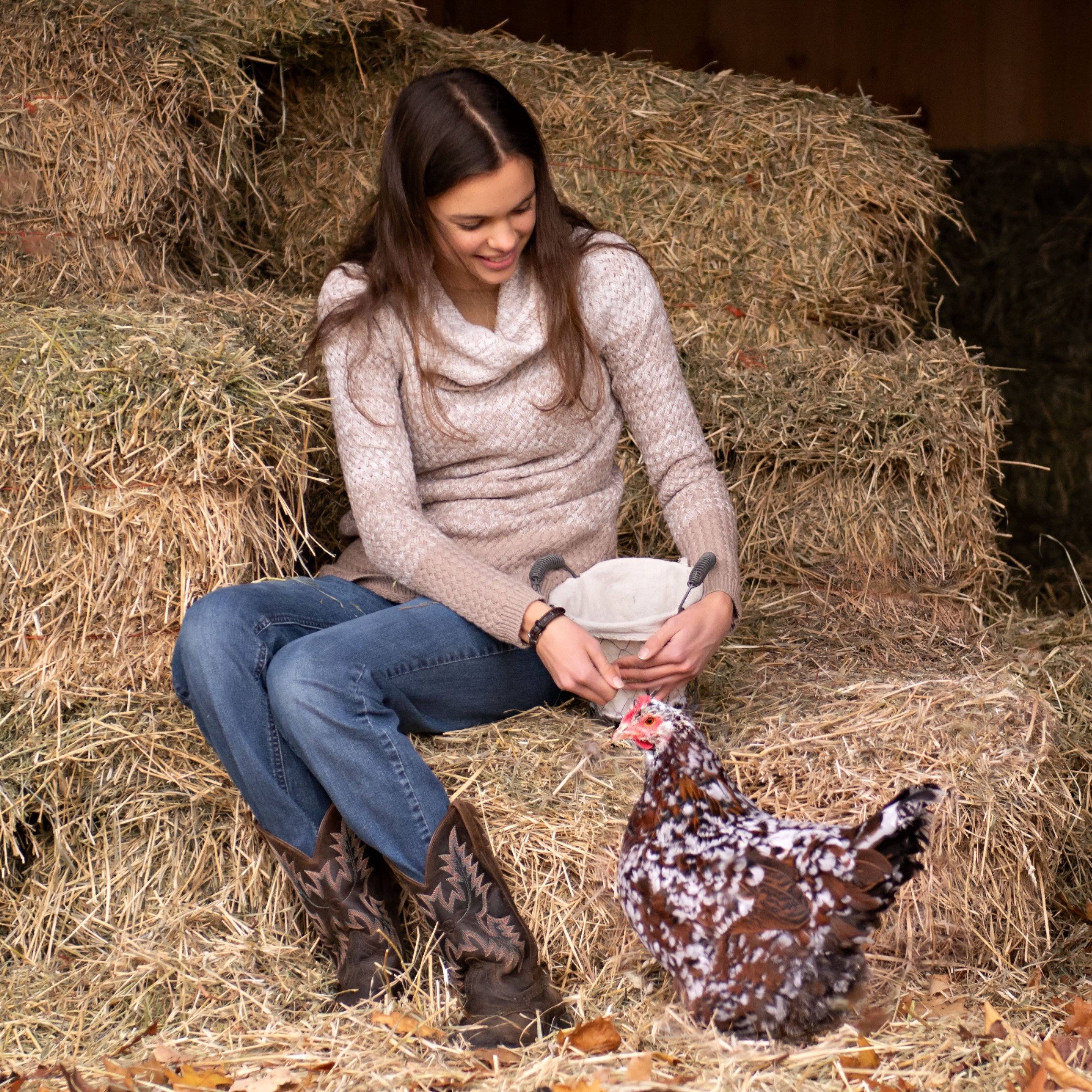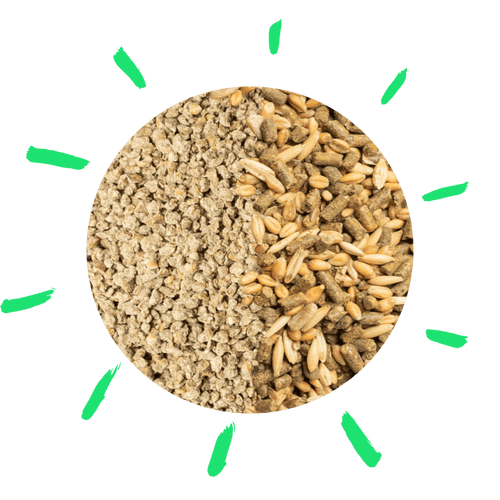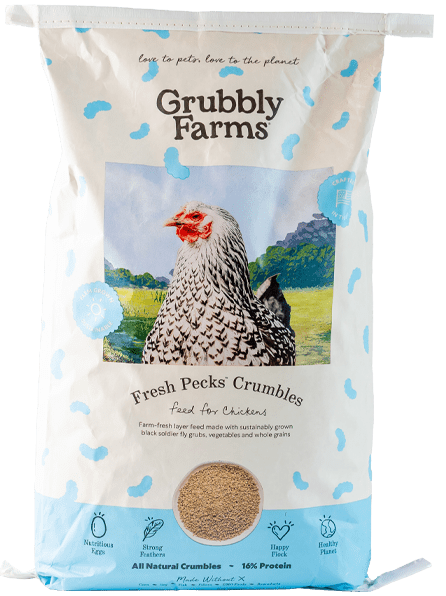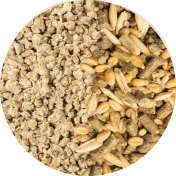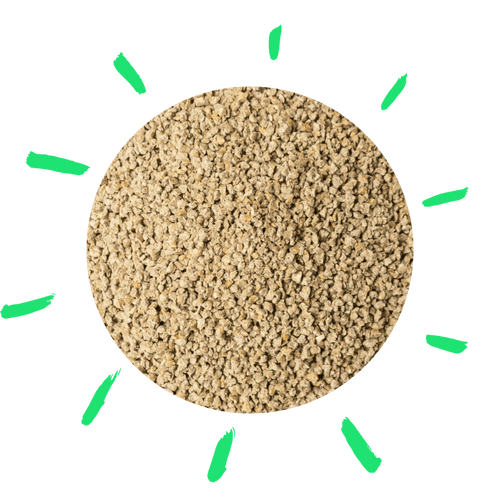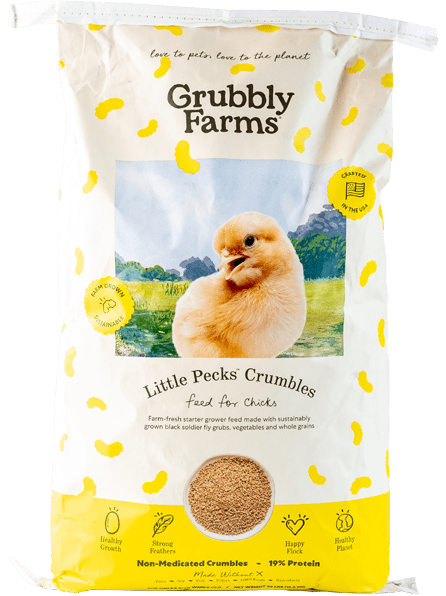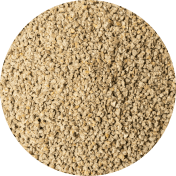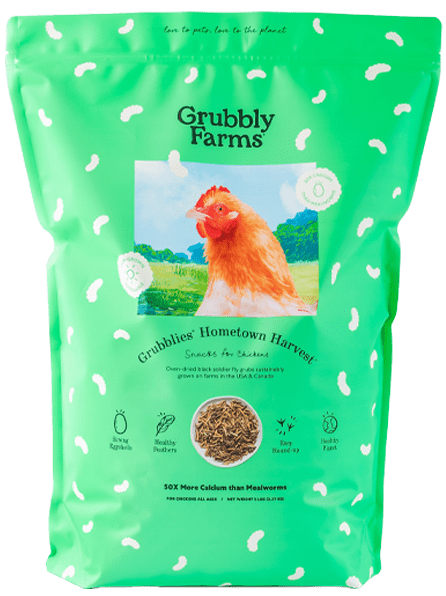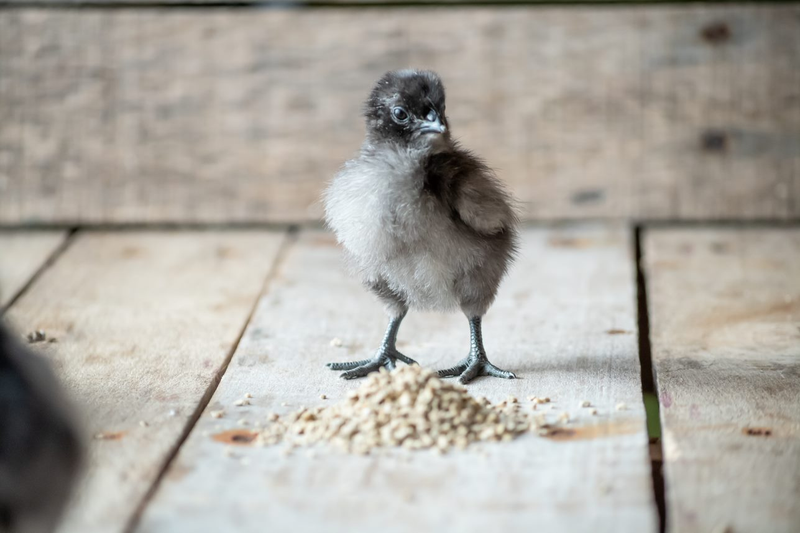Fresh eggs are just one of the many benefits we can enjoy from our backyard flocks. But when egg production slows down or halts, it can be a cause for concern. It is natural for a hen to lay eggs, and depending on the breed, some hens are very prolific layers. Understanding the reasons why hens may stop laying will help you take better care of your flock. It can also help you problem-solve if your flock suddenly stops laying or you notice a decline in egg production. Let’s explore some reasons why hens will stop laying eggs!
Understanding the Egg-Laying Cycle
A hen’s laying cycle is technically her reproductive cycle. Laying is what helps chickens naturally reproduce. Light triggers the laying cycle for hens. Once the hen reaches sexual maturity, which can be any time after 20 weeks of age, proper daylight hours trigger hormones that cause the reproductive system to start.
A hen, or pullet, needs between 12 to 16 hours of daylight in order to lay well. The pituitary gland, located on the head near the back of the comb, senses light. If the pituitary gland senses enough light within a 24-hour period, it triggers hormones that signal the ovaries to release an ova (egg yolk) into the oviduct, which starts the egg formation process. Learn more about how an egg is formed and laid in this article on How to Care for an Eggbound Chicken.
In short, it takes about 25 hours for an egg to be formed so that it can be laid. For high production hens, another ova is released within one hour after a formed egg has been laid. This allows the hen to lay an egg almost every day. However, she lays her egg about one hour later each day and eventually she will skip a day since hens don’t tend to lay in the late afternoon or evening.
This egg laying cycle continues regularly up until the hen reaches two to three years of age. After that, the natural reproductive cycle of a hen slows down. As a hen starts to age, she may not completely stop laying, but she will slow down in production and may not lay as many eggs within a week as she used to. A hen does not stop laying because the ovas in her ovaries are used up. A hen has plenty of ovas to be able to lay an egg a day for her whole life. It’s the stress of laying and aging that causes a hen to slow down in production as she gets older.
While there are several factors that can cause a hen to stop laying, the main triggers that halt production include shorter daylight hours, molting, and stress.

Factors that Affect Production
Age: Young hens (called pullets) don’t reach reproductive maturity until they are around 20 weeks of age. Chicken breeds bred for high production may start laying as early as 18 weeks of age. Heritage chicken breeds and large chicken breeds will take longer to reach reproductive maturity and may not start laying until after 24 weeks of age. Sometimes it may take as long as 6 months before you get that first egg!
It may take a little while for a young pullet’s reproductive system to get started, so she may skip a day or two of laying as she starts off. Her eggs will also be small but gradually become bigger as she starts laying more regularly. She will then lay regularly for the next two to three years of her life. Heritage chicken breeds are known to not lay as many eggs in a year as hybrid production breeds, but they have a longer productive lifespan that allows them to lay well for up to five to six years of age.
As a hen ages, her reproductive system slows down as a response to the stress of aging and regular laying. Her body starts releasing less of the hormones that trigger the reproductive cycle. Older hens also need more daylight in order to trigger laying and they are more susceptible to diseases and ailments that can stop egg production. When a chicken stops laying completely depends on the breed and individual hen. Some older hens only lay seasonally, such as during the spring and summer, while others call it quits completely.
Breed: A chicken’s breed is another factor in how well a hen lays. Hybrid chicken breeds developed for commercial egg production start laying at an early age and lay prolifically for two to three years. Then they significantly drop in production after three years of age. Heritage chicken breeds won’t start laying until they are older, but they will lay consistently for up to five to six years before slowly decreasing in production.
Season: A hen’s laying cycle is often directly impacted by the seasons. Where you live may dictate what seasons affect your laying hens the most. In the wild, spring and summer are the seasons that naturally trigger the reproductive cycle for birds. While selective breeding has changed a hen’s reproductive cycle to some extent, she is still dictated by her natural environment.
Spring is naturally a time of high egg production. The lengthening daylight hours and warming weather triggers a hen’s reproductive hormones to kick in. The longer days and warmer weather continue to encourage reproduction right through the summer months. Although, extreme heat can cause hens to experience heat stress, which may decrease or halt laying.
If one of your hens stops laying during the spring or summer but is still sitting in the nesting boxes, then you may have a broody hen on your hands. Spring and summer are not only a time of high production, but those seasons also trigger broodiness in hens who want to be mothers. Broodiness causes a hen to stop laying as she focuses on incubating her eggs and raising chicks.
As fall hits, the shortening daylight hours and cooler weather triggers the fall molt. A laying hen who is over 1 year of age will molt annually in the fall. Molting is the process that every bird goes through which involves losing old feathers and re-growing new feathers. Molting requires lots of energy, so hens will stop laying eggs since producing eggs and re-growing feathers at the same time demands too much energy.
Following on the heels of fall, the colder and shorter days of winter don’t trigger a hen’s reproductive cycle to restart after the molt. If a hen’s pituitary gland is not sensing enough light within a 24-hour period, she won’t lay eggs during the winter. Young pullets need less light in order to lay, so sometimes young pullets will lay through the winter despite the shorter daylight hours. However, cold weather can lead to cold stress, which will cause a hen to stop laying as she uses energy to stay warm instead of making eggs.
Health: A hen’s health plays a crucial role in how well she lays. Health issues like infections, diseases, parasites, or injury cause stress to a hen’s body. Fighting a disease or healing a wound requires energy that is often redirected from egg laying. Stress and lack of energy will cause a hen to stop laying when she is ill or injured. Some ailments cause malnutrition, tumors, or organ failure that would also halt production.
A hen needs to be in good health and have a proper diet in order to lay eggs.
Dirty Coop, Fewer Eggs? The Impact of Environment on Egg-Laying
A common concern that many chicken keepers have is the impact that a dirty coop can have on laying hens. The dangers of a dirty coop are serious and can affect the health, productivity, and well-being of your flock. Here are some dangers of a dirty chicken coop:
- Pests: Droppings attract flies and spilled feed will attract rodents, both of which can carry disease and parasites.
- Ammonia: Ammonia gets released into the air when droppings build up in the coop and can burn a hen’s lungs, causing respiratory damage.
- Disease: Disease-causing microbes thrive in dirty, moist environments which can lead to harmful bacteria, parasites, and protozoa building up in the coop.
- Stress: A dirty coop can sometimes be a result of overcrowding, which also stresses out chickens since they need their personal space.
All these factors can impact egg laying since any stressors in a hen’s environment may inhibit the natural egg laying cycle. When a hen is stressed due to overcrowding, disease, or difficulty of breathing, she won’t be directing energy to the process of egg laying.
Keeping your chicken coop clean and well-maintained will help your hens stay healthy and stress-free. A clean coop will prevent exposing your hens to harmful bacteria and parasites that thrive in dirty environments. Make sure the coop has plenty of space, nesting boxes, and roosts for the number of hens you are raising. A clean and spacious coop will prevent stress and disease from causing your hens to stop laying.
Here are some ways you can keep a clean coop to encourage laying:
- Remove droppings daily- Installing droppings boards underneath the roosts can help you easily remove nightly droppings on a daily basis.
- Use proper litter- Use absorbent litter that composts with any droppings that are not collected by the droppings boards. Wood shavings and straw are popular chicken coop litters.
- Remove wet or soiled litter- Keeping the coop free of moisture and manure build-up will prevent harmful bacteria and ammonia from causing health issues.
- Clean and disinfect the coop regularly- A yearly or as-needed thorough coop cleaning can help make sure the coop stays clean and fresh
- Proper ventilation- Proper ventilation ensures good air flow in the coop, which will help old, stale air be replaced with fresh, oxygen-laden air.
- Clean nests- Hens look for private, dark, and safe places to lay their eggs. Make the coop has the proper number of nesting boxes and clean nesting litter for your hens.
Health and Nutrition: A Key to Consistent Egg Production
Hens need to be healthy in order to lay well. However, laying hens are often prone to reproductive issues such as eggbinding, prolapsed vent, and reproductive cancer.
One of the more common health issues you may encounter in your laying flock is the condition of eggbinding. Eggbinding is when an egg gets stuck in the hen’s oviduct so that she can’t lay the egg. Here are some symptoms of an eggbound hen:
- Distended abdomen
- Straining
- Sudden onset of symptoms
- Decreased activity/sluggish
- Decreased appetite
- Visible egg
- Bloated abdomen
- Swollen vent
- Restlessness
- Penguin-walk
- Frequent vocalization/distressed sounds
To treat an eggbound hen, you need to help her relax. A soak in warm water can help her muscles relax enough to release the egg. Calcium supplements can also help trigger the egg laying muscles to push the egg out. As a last resort, an eggbound hen may need to be saved by careful removal of the egg. To learn more about eggbinding, visit this article on How to Care for an Eggbound Chicken.

Nutritional Factors Affecting Egg Laying
A laying hen’s health is directly related to her diet. Laying hens need a complete, well-rounded diet that provides them with all the nutrients they need to stay healthy and be productive. The main components of laying hen’s diet are protein, fat, carbohydrates, vitamins, minerals, and fresh water.
Two of the most important nutrients a hen needs in order to stay healthy and lay well are protein and calcium. Protein provides energy needed for forming and laying eggs. It also supplies hormones that are needed for triggering egg production. Calcium is needed for forming strong eggshells. It also plays an important role in triggering the muscles that help push an egg out when it is being laid.
To ensure your laying flock is getting a balanced diet, make sure these dietary elements are made available on a daily basis:
- Complete layer feed- Chicken feed formulated for laying hens has a higher calcium content and the proper vitamins and minerals needed for producing eggs.
- Supplemental calcium- Free-choice crushed oyster shells should be supplied so laying hens can consume additional calcium as needed.
- Grit- Grit should be supplied to hens who are confined and don’t have access to natural sources of grit. Grit helps aid digestion.
- Water- Fresh, clean water should be supplied daily to prevent dehydration which can lead to stress.
You should also moderate the healthy snacks and treats in your laying flock’s diet to prevent dietary imbalances. Healthy snacks should add supplemental nutrition to your flock’s diet and can be offered daily in moderation. Treats are any additional foods or table scraps you give your flock. Healthy snacks and treats should not exceed over 10% of your flock’s daily diet.
Stress and Environmental Factors: The Chicken’s Emotional Well-Being
Stress is one of the biggest factors that can cause hens to stop laying. When a stress factor is present, a hen directs the energy normally put towards laying into dealing with the stress. Physical stress factors include molting, disease, or parasites.
However, there are also environmental factors that can cause stress. Here are some common environmental stress factors that may cause hens to stop laying:
- Sudden changes such as coop moves or going to poultry shows
- Presence of predators or a predator attack
- Rough handling and being chased
- Introducing new birds to the flock, causing the pecking order to be re-established
- Lack of food or water
- Extreme heat or cold
Chickens who are stressed are more prone to illness and bad behaviors such as bullying, egg eating, or feather pecking. Some environmental stress factors can be prevented through proper flock care and management. Here are some ways to prevent stress in your backyard flock:
- Handling- Handle birds from a young age and hand feed them so that they learn you are not a threat.
- Predator Prevention- Predator proof the chicken coop and run to prevent predator attacks on your flock.
- Coop Size- Ensure your coop is spacious to prevent overcrowding that can lead to stress.
- Proper Integration- When adding new birds to your flock, follow proper integration guidelines to minimize stress.
- Food & Water- Make sure your flock always has access to plenty of food and fresh water.
- Cleanliness- Keeping the coop clean and fresh can prevent disease and ammonia from causing stress.
- Weather Stress- Prevent heat stress during the summer and cold stress during the winter.
Conclusion
Fresh eggs from your backyard flock are definitely delightful to gather on a daily basis! However, expect your hens to take periodic breaks from laying. Some breaks are natural, such as during the annual fall molt, shorter winter days, broodiness, or due to aging. Other more serious causes for hens to stop laying include an imbalanced diet, parasites, disease, or a dirty coop. Feed your laying hens a complete layer feed diet with supplemental calcium and keep their coop clean to help your flock stay healthy and productive!

